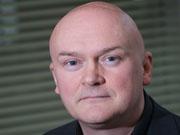A different media education

“The term ‘media’ in today’s shorthand is such a broad term that it is difficult to list in one go all the facets it covers. “Creativity” still remains a starter for ten for those considering a career in this large, fragmented industry, but that is all it is – a single building block. To actually work in “the media” requires so much more.
“One reason for this is, we don’t really know what we mean by media anymore. Digital or broadcast? New media or traditional? Interactive, platform specific, non-linear agnostic, compressionistic, stereographic, motion graphic or simply creative? Even if you have a very clearly defined media role, an accepted part of the job will be to multi-task. “Convergence” has become a stale concept in technology but a very real one in media employment.
“To work in media, however specific or non-specific the actual career line is set out to be, requires exceptional rigour, dedication, drive, skill and emotional and technological intelligence – and that’s all a pre-requisite besides the creativity that most students identify first. Media organisations want individuals with a winning combination of tenacity, charm and confidence; but, on top of this as a given, they want people with specific measurable digital technology skill. If we then take a look at how media education is actually packaged and delivered in many of our schools and colleges of further education, a gap is immediately apparent.
“For an industry which is inherently difficult to enter into and to survive in, media studies is implicitly presented as a ‘softer’ option wrapped up in a creativity agenda that leans heavily towards self-expression and genre pastiche. Even for those schools and 6th form/FE colleges heavily committed to an industry-facing creative arts programme, formal assessment often comprises summative report writing and portfolio building. It’s relatively rare for students to experience tough operational processes that challenge their interpersonal development or raw background knowledge assessment. And seldom, if ever, is the STEM (Science, Technology, Engineering and Mathematics) basis for digital media examined or actively merged. And it’s not just the educationalists’ fault – it seems to be grafted onto the UK mentality that “creativity” exists solely in the realm of the arts.
“Not only is this a mistake – if you consider Da Vinci and Michelangelo alongside Einstein and Paul Dirac, some of the most creative minds in history have been mathematical thinkers – it’s also potentially disastrous for the UK’s future standing in global digital media. In short, we need our kids to be exposed to rigorous computer skills development in the context of creative narrative end-user experiences. We need a different type of “digital media technology” education that is grounded in STEM without stifling the creative-expressive factor that schools seem to be doing so well.
“It’s time to start with the science and work our way wider. When you consider John Lasseter, Pixar’s ground-breaking, chief creative officer, it immediately poses a question – where does the computer graphics engineer end and the creative narrative genius begin? It’s a killer combination of sensibility and science that our American cousins are less squeamish about than us and it’s worth pointing out that it is precisely such a combination that drives the digital sector, especially gaming.
“Games guru, Ian Livingstone and special effects pioneer, Alex Hope’s recent report for Nesta hits the nail on the head in relation to how ‘media’ education and skills training have drifted away from the reality of at least one aspect of the digital sector. The report highlights the chasm between how ICT and science is taught and delivered in schools and the needs of a highly-tuned sector crying out for talent which is increasingly being sought from abroad.
“Encouragingly, several universities, including the University of Salford at MediaCityUK, are driving forward innovative and competitive programmes which interface with industry in compelling ways. These are the forerunners for a new way of shaping relevance for our digital industries. However, it will take a radical structural re-think to effect similar change in our schools.
“We have to work now to prevent a future scenario in which our best ‘digital’ universities become populated by overseas students as UK mainstream education continues on its current misaligned pathway. It may sound like I’m simply knocking “media studies” in schools. But I’m not. I just wish that “media studies”, as a generic humanities subject, was called something else – say “Digital Democracy”, or “Digital Life” – and that this way of looking at media perhaps should be something mandatory for every child.
“It’s important that young people are able to examine the impact of media on everyday life – such as its impact on the last General election, the live debates and social media campaigns for example. But this is a completely separate experience from hoping to carve out a future career in digital media. When we focus on the vocational pathway, a complete rethink of the status of “media studies” in schools is required – one that acknowledges the sector as one of the most rigorous and demanding there is, requiring the best our schools have to offer, and further acknowledges that to choose media is anything but a ‘soft option’.”
Jon Corner is director of University of Salford’s MediaCityUK, the teaching, research and business hub






Responses